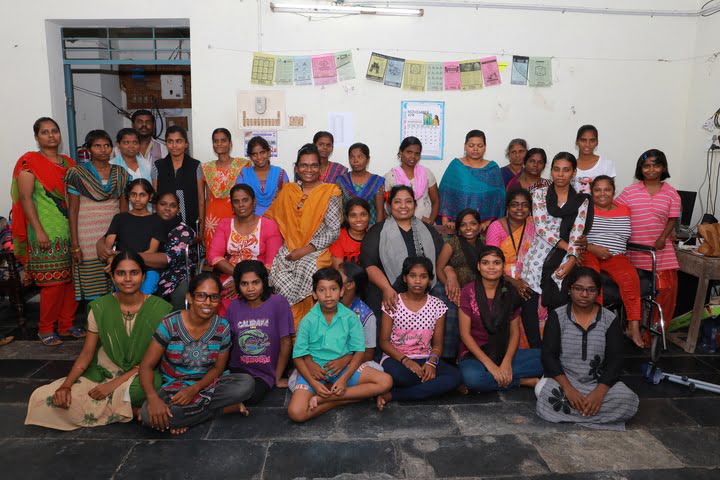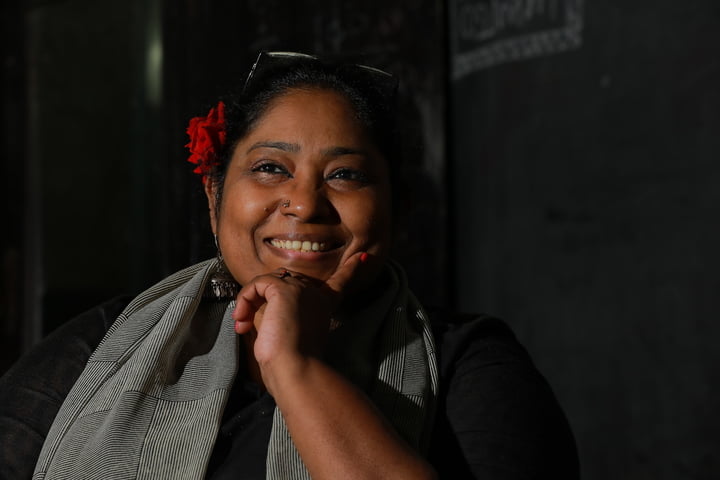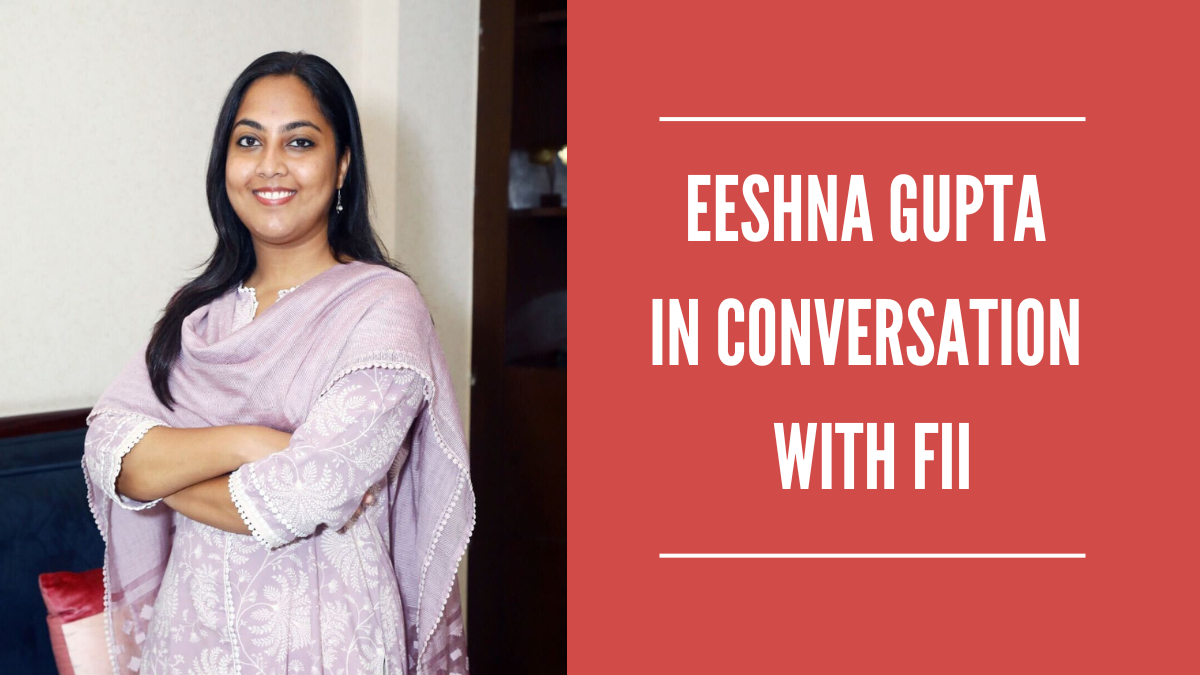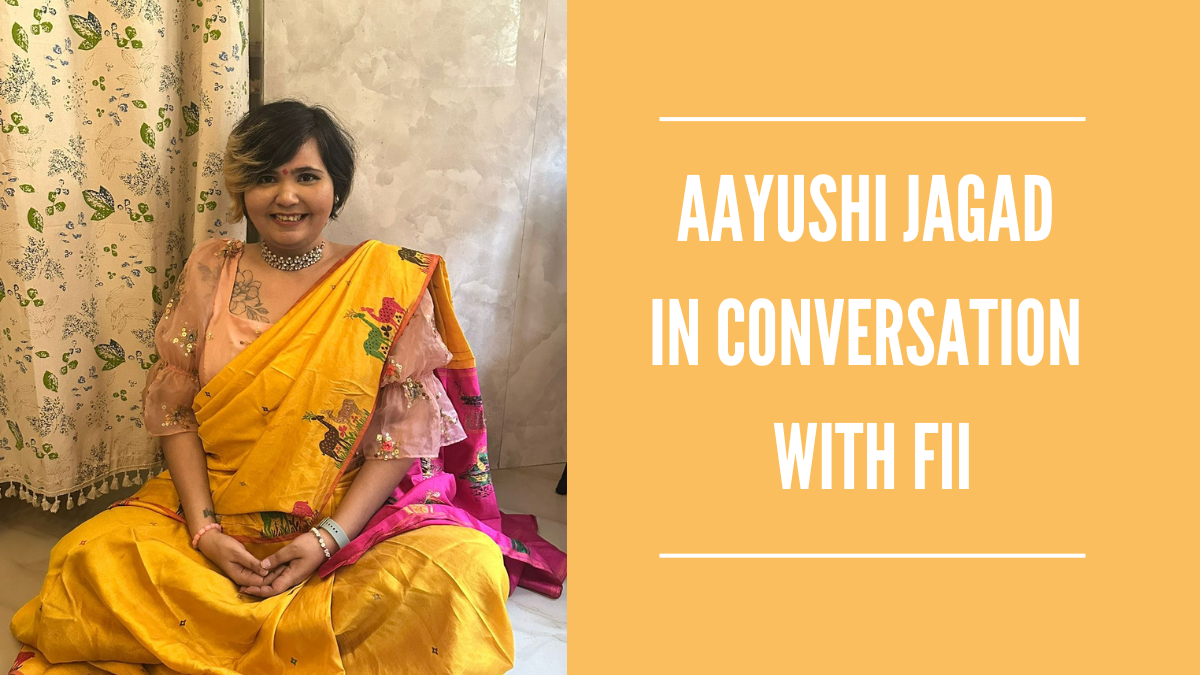“A woman by privilege, Dalit by birth, disabled by a quirk of chance, Christian by choice and doctor by calling”, Aiswarya Rao’s Facebook bio reads. Aiswarya Rao is a paediatrician, a disability rights activist, and the founder of Better World Shelter, a rehabilitation centre for disabled women in Chennai.

Let’s hear from
Alice Abraham: Tell us about yourself.
I identify myself as a woman first – then a Dalit woman, a professional woman, a woman with
AA: What has been your experience of living as a Dalit woman with disability?
AR: I grew up in Chennai in the 80s. It was a different time. My identity as a Dalit woman is a recent (past 20 years) awakening.
I did not face difficulties as a child or youngster due to my Dalit background in any peculiar way. Neither did I have defining experiences of being a person with disability growing up. I just had a ‘normal’ growing up, whatever that means. In fact, I had quite a privileged experience. My father was a senior IAS officer, and he was the District Magistrate and the Collector of Madras when I was in school. So my experiences for a great part of my life had that advantage.
I recognise my privilege. It took me a long time to recognise how I have been blind to the difficulties of people like me. But the dawning did come. As I have grown and become older, the clouds and euphoria in my head have lifted. After that understanding and insight made a breakthrough in me, it helped me understand my disability in a better way. My disability helped me understand and articulate the caste conundrum in a way that I am so surprised. They are not the same. But that insight has been so crucial to my overall enlightenment.
Disability also taught me to fight. It is a constant fight. And a clever fight. A negotiation.
To give you an example, disability taught me what systemic exclusion is. I learnt about diversity as being natural. I understand how someone who is different is always an outsider, how discrimination comes naturally to people who are in a place of power, how no one is exempt from the politics of exclusion and discrimination. A married woman with disability will look down upon a single woman with disability. If anyone can, they will. And that is true of caste too.
Disability also taught me to fight. It is a constant fight. A clever fight. A negotiation.
Disability is also a lot of fun. It taught me to love life, and seek enjoyment and pleasure in people and events. It has enriched my life so much. I will not trade it for anything in life.
AA: Tell us about the work you do people with disabilities.
AR: I work alone and with a group of like-minded people on movements at the state, national, and international level in disability rights. Apart from the access to education, employment, sports, and public participation, a good deal of my work focuses on sexual and reproductive health and rights of women with disability.
AA: Can you tell us about Better World Shelter?
AR: Better World Shelter is for women with disabilities that I started in April 2016 in Chennai. It is a safe space for women from interior Tamilnadu who need a place to stay in Chennai so that can access opportunities that elude them at home. It is not run like a hostel or a home and all the women at Better World Shelter are allowed to nourish their ambitions and make decisions for themselves. We have a para-games and para-athletics team. We have women looking for jobs, women studying for civil services, working women, women doing crafts, and anything that the women want to do. We support each other the best that we can. We have had 9 marriages so far at Better World Shelter. It is a great community of women kicking up a racket.
AA: Can you please tell us something about the campaign for amendments in the Constitution for including disability rights?
AR: The amendments in the Constitution for including disability rights is a campaign launched and sustained by the DRA (Disability Rights Alliance), a group consisting of a motley-crew of disability advocates and activists in Chennai from the 26th of November 2018, the Constitution day, leading through the World Disability day – December 3, 2018 018, until the 10th of December 2018, International Human Rights
We are fighting to amend the Constitution of India to include the word ‘impairment’ in articles 14 & 15. The constitutional amendment requires much more support and awareness among us persons with disabilities and among the
AA: What do you think of the government’s attitude and policies towards disabled people right now in India?
AR: There clearly exists lackadaisical and discriminatory attitude of the government towards people with disabilities right now in India. There are lacunae in basic rights such as from access to education, livelihood, health to the secondary cultural and political rights.

In spite of the various mandates on the appropriate government, we find that our issues are only considered as part of welfare subject. This has lead to bundling all our issues under the administration of department Social Justice or welfare depending on the State. None of the other administrative units recognises us as one of their primary stake holders. Thus, the policies across all departments, ministries and sectors are yet to be responsive and inclusive. There are also instances of discrimination and exclusion within the policy, legislative and programme frameworks. To cite a few:
- Education of children and persons with disabilities are not strictly recognised as a fundamental right. The government allows special schools and education that are not part of the system that recognises and fulfils the fundamental right to education. Educational institutions are not strictly monitored for effective inclusion of students with disabilities. Even under the programmes that promote inclusive education, students with disabilities are put under the practice of Home-Based education, which is not allowed for other children. Nearly 30% of children with disabilities have never entered any educational institutions. This is a huge problem.
- The banking and postal laws refuse to allow persons with disabilities either to open their accounts or to operate or both.
- Persons with disabilities are not recognised as equal before law everywhere and in all situations on an equal basis with others. This denies a person from enjoying full legal capacity and thus denies all citizenship rights
- Less than 1 % of persons with disabilities are engaged in any formal (both Government and private) employment. The rest of us are either part of
unorganised labour force including sheltered work and employment or remain unemployed. - Lack of access to universal design of products, works and services
has allows us to havebasic standard of living.
AA: What do you think about #MeToo movement in the context of women with disabilities?
AR: The report submitted by Disabled People’s International (India) and its partners to the Committee on the Elimination of Discrimination Against Women (CEDAW) in September 2013 reported
There are two main factors which are the problem – institutional touching and physical dependence. The problem is further compounded as sexual predators think they can get away because they think and assume 1) women with locomotor disabilities are easy prey due to their inability to run away from them, 2) women with speech and hearing impairment will not give account of their abuse or easily naming them, 3) women with visual impairment will find it difficult/impossible in identifying their aggressors, 4) women with intellectual impairment are easily manipulated and will have difficulty testifying later. These crimes go mostly unrecognised, unprosecuted, and unpunished. And the abuser is free to abuse again police and prosecutors are often reluctant to take these cases because they are difficult to win in court.
I am yet to see a serious mainstream movement throw their weight behind people with disabilities and address their pressing concerns.
At the shelter that I run, we have created a safe space where women share their #MeToo experiences. The stories we hear are gut-wrenching. We are increasingly and alarmingly seeing the huge need for education, empowerment, and societal change.
AA: What are your future goals and plans?
AR: I want to start a sports academy for persons with disabilities where men and women from all over can come and stay in a huge sports village and train and live independently. We want to create an ideal world within the village. A world where there are no barriers – both physically and in testing and challenging the human spirit. This is a small dream, of course, one that can be achieved.
The bigger dream is to challenge men and women with without disabilities to be more inclusive. That is a long way off.
AA: A note for feminists and human rights activists ?
AR: Feminists/human rights activists/Left/liberal voices in India are the worst offenders when it comes to non-inclusion of persons with disability in their agenda. Their knowledge, their focus, their understanding, their language have left a lot to be desired over the years. I have been a part of several movements over the years – Dalit, feminist, student, LGBT, health, PLHIV, children, minority rights, political rights, etc. I have seen people with disabilities rally and throw their weight behind these causes. I am yet to see a serious mainstream movement throw their weight behind people with disabilities and address their pressing concerns.
A good example is the following: In July 2017, when the GST was rolled out by the GOI, there was a levy of taxes on disability aids and appliances, disability services from 5% to 18%. This was historic as there have been nil taxes on said items and services until the GST came into force.
People with disability pay taxes too. Every other tax. But why should the disabled Indian pay for public transport/infrastructure that you, that is the society, government, politicians, services providers, businesses, etc., persist in screwing up time and again? Accessibility guidelines on government offices, metro-stations, airports, bus stands, buses, pavements, libraries, schools, colleges, parks, hospitals, clinics, etc, and not one of them carries the sanction of the statute! None of the above
The community of disabled people were in one voice asking, yet you
There was not a single voice in solidarity from the feminist/Left/Liberal spaces as the entire community of people with disabilities fought for such economic injustice. We have managed to keep the fight going and a lot of the said taxes have been rolled back from 18% to 5% and some have been done away with. But that has been a lonely fight with no augmentation from the mainstream activist community.
Also read: In Conversation With Cynthia Stephen: Dalit Activist And Writer
FII thanks Dr Aiswarya Rao for taking out time to do the interview.
Photography credits: Aiswarya Rao
About the author(s)
Alice Abraham is a literature student from Hyderabad. A book lover and foodie. She is interested in researching on gender, sexuality, queer , intersectionality, and is waiting for the fall of cis Brahaminical patriarchy.





How can she say feminists/human rights activists/left/liberals are the worst offenders? Last time I checked feminists/human rights activists/left/liberals also included disabled persons but HUMAN RIGHTS activists or LIBERALS or FEMINISTS literally stand for EQUALITY no matter what